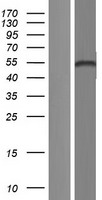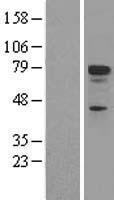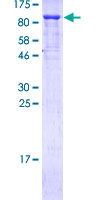order histories, retained contact details for faster checkout, review submissions, and special promotions.
Forgot password?
order histories, retained contact details for faster checkout, review submissions, and special promotions.
Locations
Orders Processing,
Shipping & Receiving,
Warehouse
2 Shaker Rd Suites
B001/B101
Shirley, MA 01464
Production Lab
Floor 6, Suite 620
20700 44th Avenue W
Lynnwood, WA 98036
Telephone Numbers
Tel: +1 (206) 374-1102
Fax: +1 (206) 577-4565
Contact Us
Additional Contact Details
order histories, retained contact details for faster checkout, review submissions, and special promotions.
Forgot password?
order histories, retained contact details for faster checkout, review submissions, and special promotions.
TP73 / p73
tumor protein p73
This gene encodes tumor protein p73, which is a member of the p53 family of transcription factors involved in cellular responses to stress and development. The family members include p53, p63, and p73 and have high sequence similarity to one another, which allows p63 and p73 to transactivate p53-responsive genes causing cell cycle arrest and apoptosis. The family members can interact with each other in many ways involving direct or indirect protein interactions, resulting in regulation of the same target gene promoters or regulation of each other's promoters. The p73 protein is expressed at very low levels in normal tissues and is differentially expressed in a number of tumors. The p73 gene expresses at least 35 mRNA variants due to the use of alternate promoters, alternate translation initiation sites, and multiple splice variations. Theoretically this can account for 29 different p73 isoforms; however, the biological validity and the full-length nature of most variants have not been determined.
| Gene Name: | tumor protein p73 |
| Synonyms: | TP73, p53-like transcription factor, p73, p53-related protein, Tumor protein p73 |
| Target Sequences: | NM_005427 NP_005418.1 O15350 |
Publications (1)







If you do not find the reagent or information you require, please contact Customer.Support@LSBio.com to inquire about additional products in development.









